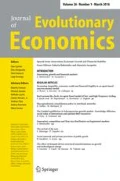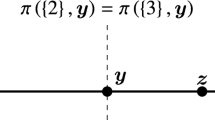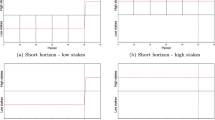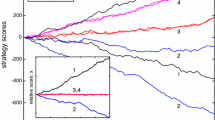Abstract
This work presents experimental results on a coordination game in which agents must repeatedly choose between two sides, and a positive fixed payoff is assigned only to agents who pick the minoritarian side. We conduct laboratory experiments in which stationary groups of five players play the game for 100 periods, and manipulate two treatment variables: the amount of information about other players’ past choices and the salience of information regarding the game history (i.e., the length of the string of past outcomes that players can see on the screen while choosing). Our main findings can be summarized as follows: aggregate efficiency in the game is in most cases significantly higher than the level corresponding to the symmetric mixed strategy Nash equilibrium. In addition, providing players with information about individual choices in the group does not improve aggregate efficiency with respect to when such information is absent. Displaying information about more rounds than just the previous one, on the other hand, seems to have a positive effect on aggregate efficiency. At the individual level, we find a stronger statistical relation between players’ current choices and their own past choices than between players’ choices and previous aggregate outcomes. In addition, the depth of the relation between present and past choices seems to be affected by the prompt availability of information about the game history. Finally, we detect evidence of a mutual co-adaptation between players’ choices over time that is partly responsible for the high level of efficiency observed.
Similar content being viewed by others
References
Arthur WB (1994) Inductive reasoning and bounded rationality. Am Econ Rev Pap Proc 84:406–412
Bottazzi G, Devetag G, Dosi G (2002) Adaptive learning and emergent coordination in minority games. Simul Model Practice Theory 10:321–347
Brown R (2000) Social identity theory: past achievements, current problems and future challenges. Eur J Soc Psychol 3:745–778
Budescu DV (1987) A Markov model for generation of binary random series. J Exp Psychol Hum Percept Perform 13:25–39
Camerer C (2003) Behavioral game theory: experiments on strategic interaction. Princeton University Press, Princeton, NJ
Camerer C, Ho T, Chong J (2002) Sophisticated experience-weighted attraction learning and strategic teaching in repeated games. J Econ Theory 104(1):137–188
Challet D, Zhang YC (1997) Emergence of cooperation and organization in an evolutionary game. Physica A 226
Challet D, Zhang YC (1998) On the minority game: Analytical and numerical studies. Physica A 256
Duffy J, Hopkins E (2001) Learning, information and sorting in market entry games: theory Exp Exobiol 01/01 University of Edinburgh, Edinburgh, UK (discussion paper)
Erev I, Rapoport A (1998) Coordination, magic, and reinforcement learning in a market entry game. Games Econom Behav 23:146–175
Erev I, Roth A (1998) Predicting how people play games: reinforcement learning in experimental games with Unique, mixed strategy equilibria. Am Econ Rev 88:848–881
Fudenberg D, Levine DK (1998) The theory of learning in games. The MIT Press, Cambridge, MA
Kahneman D (1988) Experimental economics: a psychological perspective. In: Tietz R, Albers W, Selten R (eds) Bounded rational behavior in experimental games and markets. Springer, Berlin Heidelberg New York
Meyer DJ, Huyck J, Battalio R, Saving T (1992) History’s role in coordinating decentralized allocation decisions. J Polit Econ 100:292–316
Metha J, Starmer C, Sugden R (1994) The nature of salience: an experimental investigation of pure coordination games. Am Econ Rev 84:658–673
Miller G (1956) The magical number seven, plus or minus two. Some limits of our capacity for processing information. Psychol Rev 63:81–97
Ochs J (1990) The coordination problem in decentralized markets: an experiment. Q J Econ 105:545–559
Ochs J (1995) Coordination problems. In: Kagel JH, Roth AE (eds) Handbook of experimental economics. Princeton University Press, Princeton, NJ
Rapoport A (1995) Individual strategies in a market-entry game. Group Decis Negot 4:117–133
Rapoport A, Budescu DV (1992) Generation of random series by humans: a two-person zerosum game paradigm. J Exp Psychol Gen 121:352–363
Rapoport A, Seale DA, Erev I, Sundali JA (1998) Equilibrium play in large group market entry games. Manage Sci 44:119–141
Rapoport A, Seale DA, Winter E (2000) An experimental study of coordination and learning in iterated two-market entry games. J Econ Theory 16:661–687
Selten R, Schreckenberg M, Pitz T, Chmura T, Kube S (2002) Experiments and Simulations on Day-to-Day Route Choice-Behaviour. Bonn Econ Discussion Paper 35/2002, Bonn Graduate School of Economics, Department of Economics
Schelling TC (1978) Micromotives and macrobehavior. W.W. Norton, New York
Schelling T (1960) The strategy Of conflict. Harvard University Press, Cambridge, MA
Shannon CE (1948) A mathematical theory of comunication. Bell Syst Tech J 27:329–423
Sundali JA, Rapoport A, Seale DA (1995) Coordination in market entry games with symmetric players. Org Behav Human Decis Process 64:203–218
Tajfel H, Billig MG, Bundy RP, Flament C (1971) Social categorisation and intergroup behaviour. Eur J Soc Psychol 1:149–178
Van Huyck J, Battalio R, Beil R (1990) Tacit coordination games, strategic uncertainty, and coordination failure. Am Econ Rev 80:234–248
Zwick R, Rapoport A (2002) Tacit coordination in a decentralized market entry game with fixed capacity. Exp Econ 5(3):253–272
Author information
Authors and Affiliations
Corresponding author
Rights and permissions
About this article
Cite this article
Bottazzi, G., Devetag, G. Competition and coordination in experimental minority games. J Evol Econ 17, 241–275 (2007). https://doi.org/10.1007/s00191-006-0040-6
Published:
Issue Date:
DOI: https://doi.org/10.1007/s00191-006-0040-6




